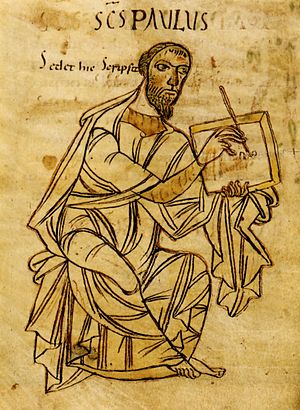This is the second post in the series: A Simonian Origin for Christianity.
| Some argue that Paul’s theology just underwent a very rapid development.
Or that he changed his position to suit changed circumstances. Others chalk up the inconsistency to his temperament. He was impulsive and wrote things in anger that he probably regretted later. Or he toyed with ideas that he never seriously embraced. Some say he just had an undisciplined mind and that we should therefore not expect logical consistency from him. Was he even aware that his assertions were contradictory? Some scholars think so, and that love of paradox may explain his apparent unconcern for contradictions. But others think he was clueless. . . . from the very first indications in the extant record of the existence of a collection of Pauline letters voices were raised to protest that it had been tampered with. . . . |
.
.
A Reworked Collection of Simonian Letters
.
Pauline Zigzags

A major problem for Pauline interpreters has always been how to explain the inconsistency of Paul’s theology. The inconsistency shows up, especially when the letters deal with subjects about which the proto-orthodox and early gnostics had differing positions. It is particularly noticeable in passages concerning the Law.
For instance, has the Law been abolished? Or is it still valid?
You can find passages in the Paulines to support both positions.
Can anyone actually do all that the Law requires?
Again, one can find Pauline passages to support either a yes or no answer.
Was the Law given by God? Or by angels?
That depends on which Pauline passage you look at.
Was the purpose of the Law to incite man to sin and multiply transgressions? Or to lead men to life?
Again, the letters can be enlisted to support either.
Did the author of the letters think that being under the Law was something to be rightfully proud of? Or was it slavery?
It depends.
All kinds of explanations have been offered to account for the zigzagging, but with nothing close to a consensus reached. There are those, for instance, who argue that Paul’s theology just underwent a very rapid development. Or that he changed his position to suit changed circumstances. Others chalk up the inconsistency to his temperament. He was impulsive and wrote things in anger that he probably regretted later. Or he toyed with ideas that he never seriously embraced. Some say he just had an undisciplined mind and that we should therefore not expect logical consistency from him. Was he even aware that his assertions were contradictory? Some scholars think so, and that love of paradox may explain his apparent unconcern for contradictions. But others think he was clueless:
[T]he thought wavers and alters with heedless freedom from one letter to another, even from chapter to chapter, without the slightest regard for logical consistency in details. His points of view and leading premises change and traverse without his perceiving it. It is no great feat to unearth contradictions, even among his leading thoughts. (William Wrede, Paul, p. 77, my italics)
Ten scholars who argue for interpolation
But there have always been scholars who solved the problem of Pauline inconsistency by questioning whether the letters were in fact the work of only one writer. And not just the Deutero-Pauline letters, but also the seven generally regarded as authentic. The inconsistencies existing right within the individual letters are such that many think it more likely that more than one writer was involved:
If the choice lies between supposing that Paul was confused and contradictory and supposing that his text has been commented upon and enlarged, I have no hesitation in choosing the second. (J.C. O’Neill, The Recovery of Paul’s Letter to the Galatians, p. 86) Continue reading “A Simonian Origin for Christianity, Part 2: The Letters of Paul”
